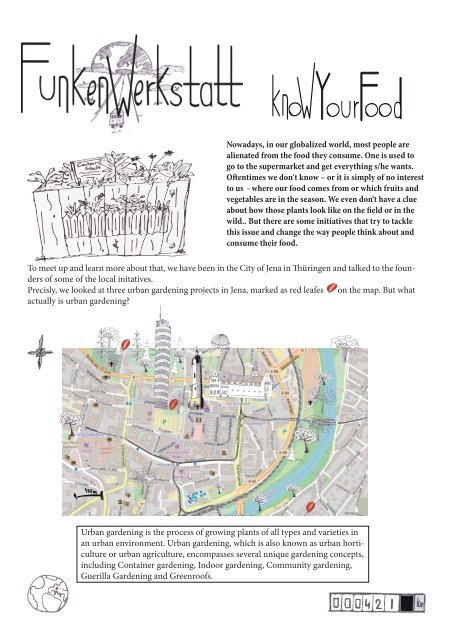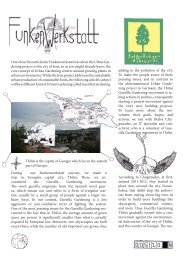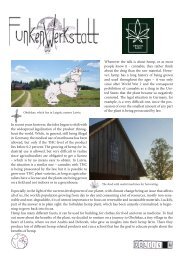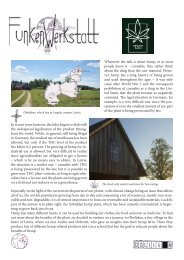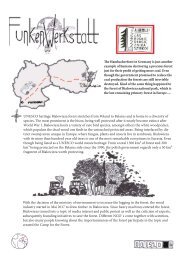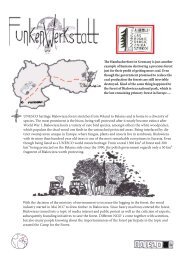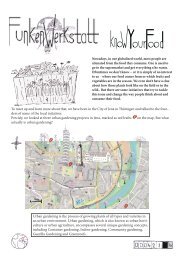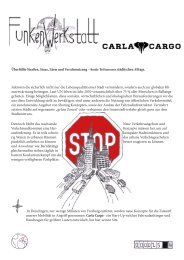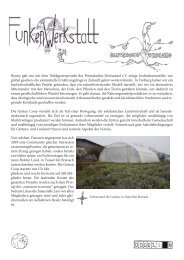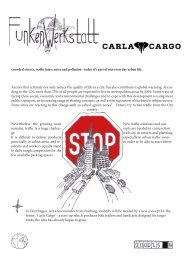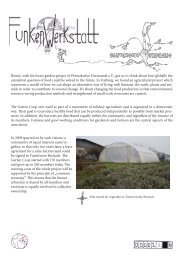Funkenwerkstatt-UGJenglishfinal.1
Create successful ePaper yourself
Turn your PDF publications into a flip-book with our unique Google optimized e-Paper software.
Nowadays, in our globalized world, most people are<br />
alienated from the food they consume. One is used to<br />
go to the supermarket and get everything s/he wants.<br />
Oftentimes we don't know – or it is simply of no interest<br />
to us - where our food comes from or which fruits and<br />
vegetables are in the season. We even don‘t have a clue<br />
about how those plants look like on the field or in the<br />
wild.. But there are some initiatives that try to tackle<br />
this issue and change the way people think about and<br />
consume their food.<br />
To meet up and learn more about that, we have been in the City of Jena in Thüringen and talked to the founders<br />
of some of the local initatives.<br />
Precisly, we looked at three urban gardening projects in Jena, marked as red leafes on the map. But what<br />
actually is urban gardening?<br />
Urban gardening is the process of growing plants of all types and varieties in<br />
an urban environment. Urban gardening, which is also known as urban horticulture<br />
or urban agriculture, encompasses several unique gardening concepts,<br />
including Container gardening, Indoor gardening, Community gardening,<br />
Guerilla Gardening and Greenroofs.
I sat down with Roland Bischof, a biologist from Jena, who is part of a few of those initiatives, and talked to him<br />
about the projects he’s engaging in. Initially having come to Jena to study Biology in 2002, Roland came back in<br />
2009 and since has been working in the field of agronomic research and education. After the research projects<br />
lessened, he wanted to expand his scope ofactivities, starting to work with farmers, schools and engineering<br />
offices to make the most of hisknowledge. This is how he came to work with the local projects Solidarische<br />
Landwirtschaft („Community Supported Agriculture“) and Essbare Stadt („Edible City“).<br />
This is one Urban-Gardening spot at the Eichplatz „Gemeinschaftsgarten“ in Jena<br />
nearby the Jentower.<br />
The latter, Essbare Stadt, is a projec t which, starting in 2009, tries to achieve a closer connection between the<br />
local growers and the consumers, minimizing the transpor t distance of the food. Work ing together with a<br />
local gardening center and integrating handicapped people, the registered association cultivates an area of<br />
2000 m². At the beginning of the year, all those who are interested (up to 25 par ties) can buy holdings of the<br />
harvest for around 480 Euro, guaranteeing the deliver y of one box of fresh and seasonal vegetables and fruits<br />
per week - if available, even juices and honey.<br />
Thus, as shown on the left, it is a perfect example of a regional<br />
economy: Locals connect to regional growers through<br />
financial support and in return the growers cultivate<br />
and harvest vegetables and other products for them.
Naturally, the amount of food they get varies throughout the year: “During summer and autumn, it is oftentimes<br />
more food then the customers alone could eat themselves. If that is the case they share it with others,<br />
for example inviting friends for dinner“, explains Roland, who supervises the plant cultivation. In the winter<br />
months, the customers get a box every two weeks only, because of the lower yields. “You get more excited about<br />
the products if they are not available all throughout the year. You get a greater appreciation for the goods.“ All<br />
costumers have the possibility to visit the fields and take a look at the plants and how they are grown.<br />
The Essbare Stadt collective pursues a pretty similar concept. People who are growing up and living in the city<br />
sometimes have not seen the matching plant to the food they consume in everyday life. A simple reason for<br />
that is that usually those plants do not grow in an urban surrounding – unlike the Essbare Stadt. The collective<br />
was founded in 2013 by around five people who had heard from this idea that had been established in other<br />
cities before. The idea is simple: Use urban areas to grow fruits and vegetables, thus people are able to see how<br />
it is done!<br />
Furthermore, some people may see that it is possible to use even a very small area to grow food and to not<br />
always have to rely on supermarkets. This is what Roland emphasises about the project: “For me, the educational<br />
part of this project is the most important. You probably will not grow enjoyable food right next to<br />
a busy road.“<br />
When founded, the collective approached the public authorities to ask which areas could be used for the project<br />
and, after about half a year, they achieved an agreement. “The areas were not ideal, but we made the best<br />
out of them“, explains Roland. They now look after three areas in the city, with two people responsible for each.<br />
They meet once per week to discuss upcoming events, oftentimes right in the concerning areas and work on<br />
developing them afterwards. One of those areas is located right in the city center, next to the biggest parking<br />
lot of the town. With flowers and different shrubs they transformed it into a place where people now enjoy the<br />
sun and pick strawberries, naturally for free, between the shopping centers. The project furthermore addresses<br />
the community spirit, which is about usingthe city together. Even some local companies joined the movement<br />
and put little raised beds in front of their offices.
If you drew some inspiration from those projects and maybe<br />
want to start similar ones in your city, Roland advises threesteps:<br />
“First search for allies, because together you are more likely to<br />
convince people of your concept – especially the officals.<br />
Secondly, inform yourselves about how other people tackledsuch<br />
projects and, believe me,there are lots of them. Once you are well<br />
prepared, go to the citys‘ officials and pitch them your idea.“<br />
Here is some information about the projects that were<br />
mentioned in this article:<br />
www.wurzelwerke-jena.de<br />
www.jenaparadieschen.wordpress.com<br />
www.essbarestadtjena.tumblr.com<br />
www.ecolife.com<br />
Roland Bischof<br />
Sven, Julian, David und Anna


